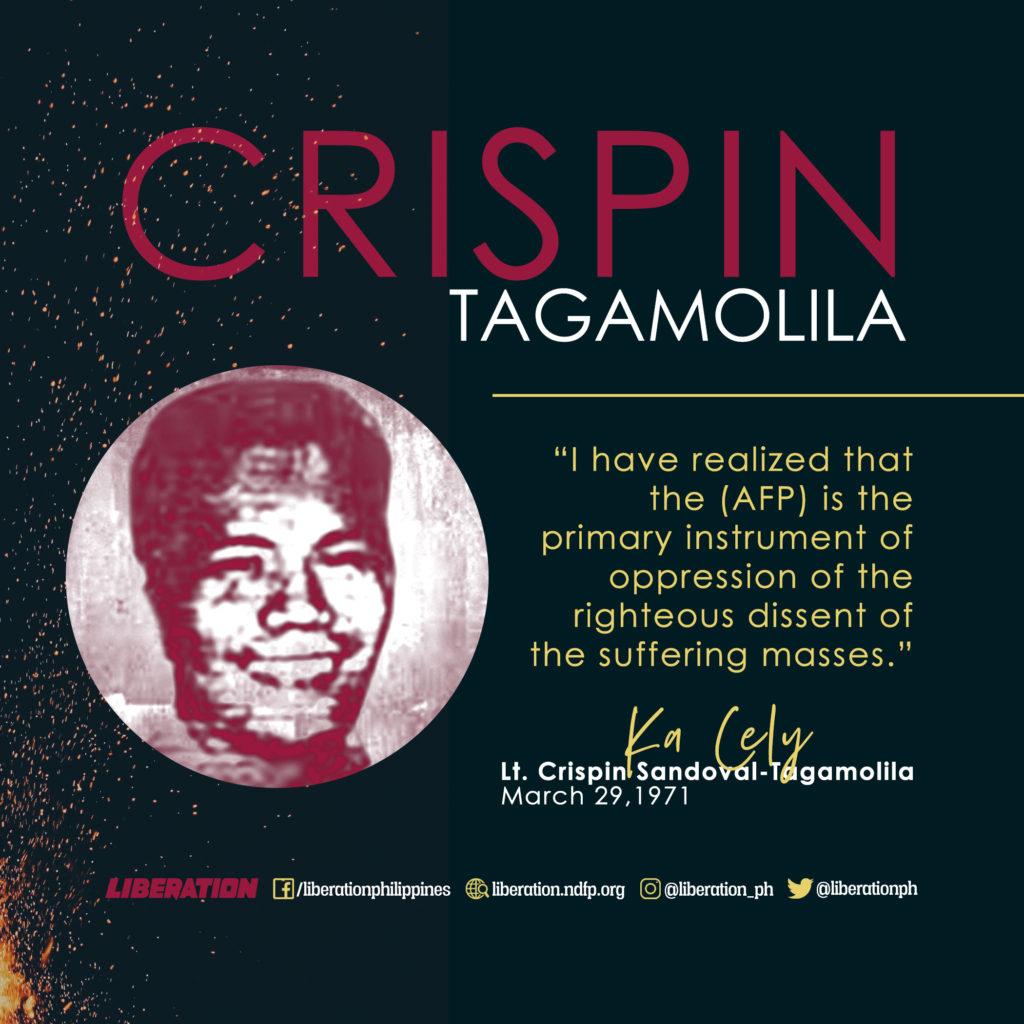On the 50th anniversary of the founding of the New People’s Army (NPA) on March 29, 2019, the revered memory of a martyr of the revolution comes to mind. On the same day in 1971, the second anniversary of the NPA, the 26-year old Armed Forces of the Philippines (AFP) Lt. Crispin S. Tagamolila defected to the revolutionary people’s army. In his statement, he cited, “I have realized that the (AFP) is the primary instrument of oppression of the righteous dissent of the suffering masses,” as reason for his defection.
 Born on January 7, 1945 in Tubungan, Iloilo, Crispin spent his early years of education in the La Paz Elementary School and the Iloilo High School. He was the third of five children of Manuel Tagamolila and Casiana Sandoval. One of his siblings, his younger brother Antonio, a former Philippine Collegian editor and national president of the College Editor’s Guild of the Philippines, was also killed in an encounter in the mountains of Panay, two years after Crispin’s death.
Born on January 7, 1945 in Tubungan, Iloilo, Crispin spent his early years of education in the La Paz Elementary School and the Iloilo High School. He was the third of five children of Manuel Tagamolila and Casiana Sandoval. One of his siblings, his younger brother Antonio, a former Philippine Collegian editor and national president of the College Editor’s Guild of the Philippines, was also killed in an encounter in the mountains of Panay, two years after Crispin’s death.
After finishing his bachelor’s degree in Business Administration at the University of the Philippines in 1966, he enrolled at the Philippine Military Academy. Upon graduation in 1967, he was commissioned as a regular officer in the AFP. While serving in the army he took up law at the Philippine Constabulary Law School while at the same time taught nationalism, Philippine History and Philippine heroes. As a law student, he excelled in his studies, always landing among the five top students of his class. However, due to his radical views on politico-social issues, the Intelligence Service of the Armed Forces of the Philippines (ISAFP) put him under surveillance. In an attempt to restrain his activities, the ISAFP offered to bribe him with a promotion that he readily declined.
While in the service, he witnessed the control of US imperialism on the AFP through the Joint US Military Assistance Group (JUSMAG)—the aid and training it gave the Philippine army and police personnel on counter-insurgency techniques, crowd control and gangsterism. He was also immensely disgusted with how Marcos used the military to suppress his critics and perpetuate his rule while he tolerated the rampant corruption of his anointed generals.
His realization sealed his decision to leave the puppet armed forces and join the people’s revolutionary army. “It is indeed only through armed struggle by the people and the army against the exploiters that the masses can hope for a just and progressive society,” he expounded in his statement.
In the people’s army, Crispin was known by his nom de guerre “Ka Cely”. His political and military knowledge has contributed much to the masses and his comrades. From 1969 to 1972, the expansion of the organized mass base in Isabela reached 150,000.
“Ka Cely” was killed in an encounter on April 16, 1972 in Echague, Isabela while covering the retreat of his comrades. Upon his death, his family came up with a statement: “We are crying, we are saddened because he is no longer with us, but most of all we are grieving because he can no longer serve the people and the country he loved so much.”
Much as Crispin Tagamolila’s death is a loss to the revolution, it is not all in vain. It has inspired and steeled the resolve of the revolutionary movement to advance the people’s struggle. The seed he had sown has bloomed to fruition as the flame of the revolution engulfed the archipelago; as the revolution advances, much stronger, more adept and more determined to attain national and social liberation, thwarting all Oplans hatched by US imperialism and its puppet regimes in the past 50 years.





